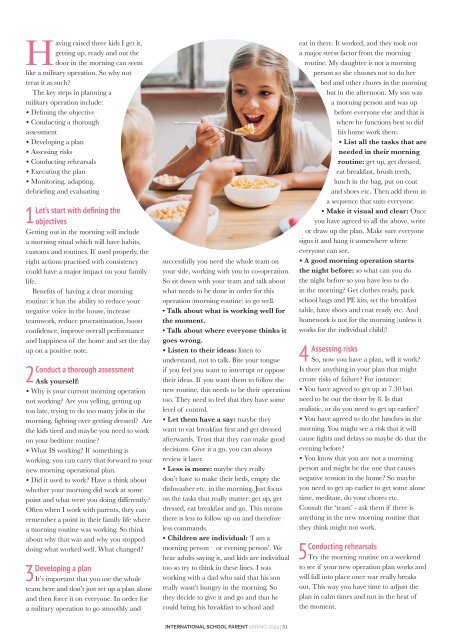International School Parent Magazine - Spring 2024
Welcome to the first edition of the International School Parent Magazine for 2024. We hope that you enjoy reading it as much as we enjoyed putting it together. Spring is a wonderful time – the weather is warmer, and the longer days help to boost our motivation. It is also the perfect time to start thinking about summer camps. We have curated a list of inspiring and interesting programmes and have presented them to you in a special feature beginning on page 40. In this edition we had the pleasure of interviewing both Nicola Sparrow, School Director of Aiglon College, and Andrea Spielmann, the Principal of the new SIS Basel-Allschwil school. In these articles, both these accomplished women share their passion for education and provide insight into the culture and ethos of their respective schools. We also continue our discussion of children’s mental health, drug use, communication, travel, and present many more interesting and topical articles and commentary. Check out the articles about the family activities in Lichtenstein, as well as unusual and exciting things to do in Switzerland, and an introduction to Basel the Swiss capital of culture and architecture. Once again, we are thrilled to present to you a magazine filled with interesting and informative articles, exciting experiences, and practical tips for parents. Have a wonderful spring and we look forward to bringing you more content again in summer.
Welcome to the first edition of the International School Parent Magazine for 2024. We hope that you enjoy reading it as much as we enjoyed putting it together.
Spring is a wonderful time – the weather is warmer, and the longer days help to boost our motivation. It is also the perfect time to start thinking about summer camps. We have curated a list of inspiring and interesting programmes and have presented them to you in a special feature beginning on page 40.
In this edition we had the pleasure of interviewing both Nicola Sparrow, School Director of Aiglon College, and Andrea Spielmann, the Principal of the new SIS Basel-Allschwil school. In these articles, both these accomplished women share their passion for education and provide insight into the culture and ethos of their respective schools.
We also continue our discussion of children’s mental health, drug use, communication, travel, and present many more interesting and topical articles and commentary.
Check out the articles about the family activities in Lichtenstein, as well as unusual and exciting things to do in Switzerland, and an introduction to Basel the Swiss capital of culture and architecture.
Once again, we are thrilled to present to you a magazine filled with interesting and informative articles, exciting experiences, and practical tips for parents. Have a wonderful spring and we look forward to bringing you more content again in summer.
Create successful ePaper yourself
Turn your PDF publications into a flip-book with our unique Google optimized e-Paper software.
Having raised three kids I get it,<br />
getting up, ready and out the<br />
door in the morning can seem<br />
like a military operation. So why not<br />
treat it as such?<br />
The key steps in planning a<br />
military operation include:<br />
• Defining the objective<br />
• Conducting a thorough<br />
assessment<br />
• Developing a plan<br />
• Assessing risks<br />
• Conducting rehearsals<br />
• Executing the plan<br />
• Monitoring, adapting,<br />
debriefing and evaluating<br />
1Let’s start with defining the<br />
objectives<br />
Getting out in the morning will include<br />
a morning ritual which will have habits,<br />
customs and routines. If used properly, the<br />
right actions practised with consistency<br />
could have a major impact on your family<br />
life.<br />
Benefits of having a clear morning<br />
routine: it has the ability to reduce your<br />
negative voice in the house, increase<br />
teamwork, reduce procrastination, boost<br />
confidence, improve overall performance<br />
and happiness of the home and set the day<br />
up on a positive note.<br />
2Conduct a thorough assessment<br />
Ask yourself:<br />
• Why is your current morning operation<br />
not working? Are you yelling, getting up<br />
too late, trying to do too many jobs in the<br />
morning, fighting over getting dressed? Are<br />
the kids tired and maybe you need to work<br />
on your bedtime routine?<br />
• What IS working? If something is<br />
working, you can carry that forward to your<br />
new morning operational plan.<br />
• Did it used to work? Have a think about<br />
whether your morning did work at some<br />
point and what were you doing differently?<br />
Often when I work with parents, they can<br />
remember a point in their family life where<br />
a morning routine was working. So think<br />
about why that was and why you stopped<br />
doing what worked well. What changed?<br />
3Developing a plan<br />
It’s important that you use the whole<br />
team here and don’t just set up a plan alone<br />
and then force it on everyone. In order for<br />
a military operation to go smoothly and<br />
successfully you need the whole team on<br />
your side, working with you in co-operation.<br />
So sit down with your team and talk about<br />
what needs to be done in order for this<br />
operation (morning routine) to go well.<br />
• Talk about what is working well for<br />
the moment.<br />
• Talk about where everyone thinks it<br />
goes wrong.<br />
• Listen to their ideas: listen to<br />
understand, not to talk. Bite your tongue<br />
if you feel you want to interrupt or oppose<br />
their ideas. If you want them to follow the<br />
new routine, this needs to be their operation<br />
too. They need to feel that they have some<br />
level of control.<br />
• Let them have a say: maybe they<br />
want to eat breakfast first and get dressed<br />
afterwards. Trust that they can make good<br />
decisions. Give it a go, you can always<br />
review it later.<br />
• Less is more: maybe they really<br />
don’t have to make their beds, empty the<br />
dishwasher etc. in the morning. Just focus<br />
on the tasks that really matter: get up, get<br />
dressed, eat breakfast and go. This means<br />
there is less to follow up on and therefore<br />
less commands.<br />
• Children are individual: ‘I am a<br />
morning person – or evening person’. We<br />
hear adults saying it, and kids are individual<br />
too so try to think in these lines. I was<br />
working with a dad who said that his son<br />
really wasn’t hungry in the morning. So<br />
they decide to give it and go and that he<br />
could bring his breakfast to school and<br />
eat in there. It worked, and they took out<br />
a major stress factor from the morning<br />
routine. My daughter is not a morning<br />
person so she chooses not to do her<br />
bed and other chores in the morning<br />
but in the afternoon. My son was<br />
a morning person and was up<br />
before everyone else and that is<br />
where he functions best so did<br />
his home work there.<br />
• List all the tasks that are<br />
needed in their morning<br />
routine: get up, get dressed,<br />
eat breakfast, brush teeth,<br />
lunch in the bag, put on coat<br />
and shoes etc. Then add them in<br />
a sequence that suits everyone.<br />
• Make it visual and clear: Once<br />
you have agreed to all the above, write<br />
or draw up the plan. Make sure everyone<br />
signs it and hang it somewhere where<br />
everyone can see.<br />
• A good morning operation starts<br />
the night before: so what can you do<br />
the night before so you have less to do<br />
in the morning? Get clothes ready, pack<br />
school bags and PE kits, set the breakfast<br />
table, have shoes and coat ready etc. And<br />
homework is not for the morning (unless it<br />
works for the individual child)!<br />
4<br />
Assessing risks<br />
So, now you have a plan, will it work?<br />
Is there anything in your plan that might<br />
create risks of failure? For instance:<br />
• You have agreed to get up at 7.30 but<br />
need to be out the door by 8. Is that<br />
realistic, or do you need to get up earlier?<br />
• You have agreed to do the lunches in the<br />
morning. You might see a risk that it will<br />
cause fights and delays so maybe do that the<br />
evening before?<br />
• You know that you are not a morning<br />
person and might be the one that causes<br />
negative tension in the home? So maybe<br />
you need to get up earlier to get some alone<br />
time, meditate, do your chores etc.<br />
Consult the ‘team’ - ask them if there is<br />
anything in the new morning routine that<br />
they think might not work.<br />
5<br />
Conducting rehearsals<br />
Try the morning routine on a weekend<br />
to see if your new operation plan works and<br />
will fall into place once war really breaks<br />
out. This way you have time to adjust the<br />
plan in calm times and not in the heat of<br />
the moment.<br />
INTERNATIONAL SCHOOL PARENT SPRING <strong>2024</strong> | 51














